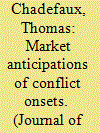| Srl | Item |
| 1 |
ID:
128853


|
|
|
|
|
| Publication |
2014.
|
| Summary/Abstract |
There have been more than 200 wars since the start of the 20th century, leading to about 35 million battle deaths. However, efforts at forecasting conflicts have so far performed poorly for lack of fine-grained and comprehensive measures of geopolitical tensions. In this article, a weekly risk index is derived by analyzing a comprehensive dataset of historical newspaper articles over the past century. News reports have the advantage of conveying information about contemporaries' interpretation of events and not having to rely on meaning inferred a posteriori with the benefit of hindsight. I applied this new index to a dataset of all wars within and between countries recorded since 1900, and found that the number of conflict-related news items increases dramatically prior to the onset of conflict. Using only information available at the time, the onset of a war within the next few months could be predicted with up to 85% confidence and predictions significantly improved upon existing methods both in terms of binary predictions (as measured by the area under the curve) and calibration (measured by the Brier score). Predictions also extend well before the onset of war - more than one year prior to interstate wars, and six months prior to civil wars - giving policymakers significant additional warning time.
|
|
|
|
|
|
|
|
|
|
|
|
|
|
|
|
| 2 |
ID:
152305


|
|
|
|
|
| Summary/Abstract |
Does the recurrence of wars suggest that we fail to recognize dangerous situations for what they are, and are doomed to repeat the errors of the past? Or rather that policymakers correctly anticipate the consequences of their actions but knowingly choose conflict? Unfortunately, little is known about how well wars are anticipated. Do conflicts tend to come as a surprise? I estimated the risk of war as perceived by contemporaries of all interstate and intrastate conflicts between 1816 and 2007. Using historical financial data of government bond yields, I find that market participants tend to underestimate the risk of war prior to its onset, and to react with surprise immediately thereafter. This result illustrates how conflict forecasts can be self-fulfilling or self-defeating. Present predictions may affect future behavior, such that wars may be less likely to occur when they are predicted, but more likely when they are not. I also show that the forecasting record has not improved over the past 200 years, and that wars involving democracies lead to greater market shocks. These findings also have implications for the way decisionmakers respond to new information, and how audiences perceive the risk of war and hence their leaders’ actions.
|
|
|
|
|
|
|
|
|
|
|
|
|
|
|
|